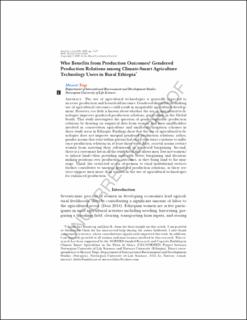Who Benefits from Production Outcomes? Gendered Production Relations among Climate-Smart Agriculture Technology Users in Rural Ethiopia
Peer reviewed, Journal article
Accepted version
Permanent lenke
https://hdl.handle.net/11250/2739289Utgivelsesdato
2019Metadata
Vis full innførselSamlinger
Sammendrag
The use of agricultural technologies is generally expected to increase production and household incomes. Gendered disparities in making use of agricultural outcomes could result in inequitable agricultural develop-ment. However, too little is known about whether the use of agricultural tech-nologies improves gendered production relations, particularly in the Global South. This study investigates the question of gender-equitable production relations by drawing on empirical data from women and men smallholders involved in conservation agriculture and small-scale irrigation schemes in three study areas in Ethiopia. Findings show that the use of agricultural tech-nologies does not improve unequal gendered production relations; rather, gender norms that exist within patriarchal social structures continue to influ-ence production relations in at least three ways. First, societal norms restrict women from asserting their self-interest in gendered bargaining. Second, there is a customary law in all the study areas that allows men (but not women) to inherit land—thus providing men with better bargaining and decision-making positions over production outcomes, as they bring land to the mar-riage. Third, the restricted access of women to rural institutional services further contributes to unequal gendered production relations, as these ser-vices support men more than women in the use of agricultural technologies for enhanced production.

